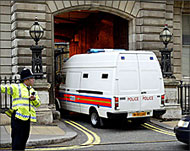UK says it is tracking 30 ‘terror plots’
British intelligence services are tracking more than 1,600 people from 200 groups or networks who are “actively engaged in terrorism”, the head of MI5, the domestic spy agency, has said.

Dame Eliza Manningham-Buller said on Thursday that MI5 was aware of nearly 30 “plots to kill people and to damage our economy”.
The risk to Britain was “sustained … not a series of isolated incidents” and the “serious, growing threat …” from terrorism would last a generation, she said.
Her assessment, made in a rare public speech, came after Dhiren Barot, a Briton, was jailed for life on Tuesday for plotting to kill thousands of people in devastating attacks in Britain and the United States.
‘Speedy’ radicalisation
Manningham-Buller said MI5’s caseload of British-based terror sympathisers – many of them British citizens – had increased by 80 per cent since January and she was alarmed by the “scale and speed” of radicalisation.
“Martyrdom” videos of suicide bombers were motivated in part by “their interpretation as anti-Muslim of UK foreign policy, in particular the UK’s involvement in Iraq and Afghanistan,” she told academics in east London.
“Today my officers and the police are working to contend with some 200 groupings or networks, totalling over 1,600 identified individuals – and there will be many more we don’t know – who are actively engaged in plotting, or facilitating, terrorist acts here and overseas.
“What we see at the extreme end of the spectrum are resilient networks, some directed from al-Qaeda in Pakistan, some more loosely inspired by it, planning attacks including mass-casualty suicide attacks in the UK.”
Tony Blair, the British prime minister, and his government have repeatedly denied a link between extremism and British foreign policy.
Nuclear material
The MI5 director-general was quoted as saying that while home-made, improvised explosives may be used today, chemical, bacteriological, radioactive and even nuclear material will be used in the future.
 |
|
MI5 says its ‘terror’ caseload has |
Manningham-Buller also expressed concern that many involved were young men and teenagers as young as 16.
“More and more people are moving from passive sympathy towards active terrorism through being radicalised or indoctrinated by friends, families, in organised training events here and overseas …” she said.
High alert
Britain has been on high alert after the July 7, 2005, bombings on London’s public transport network that killed the four Muslim suicide bombers and 52 commuters and injured more than 700.
There was an alleged attempt to replicate the attacks two weeks later while on August 10 this year, police and security services foiled what they said was a plot to blow up transatlantic passenger jets using liquid explosives.
The head of counter-terrorism at London’s Metropolitan Police, Peter Clarke, said in an interview broadcast in September that thousands of British Muslims were under surveillance for direct or indirect involvement in terrorism.